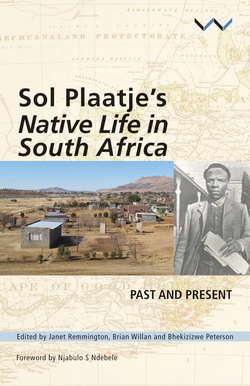Читать книгу Sol Plaatje's Native Life in South Africa - Jacob Dlamini - Страница 9
На сайте Литреса книга снята с продажи.
The 1913 Natives' Land Act and campaigning abroad
ОглавлениеIt was in the dual capacity of political leader and newspaper editor that Plaatje led the campaign against the Natives' Land Act of 1913, the focus of Native Life. The Land Act was by far the greatest challenge the new Congress faced and it was galvanised into action. The Land Act claimed to implement the principle of territorial segregation or separation. It proposed to confine African landholding to some 7.3 per cent of the total land surface of the Union, prohibiting Africans from purchasing land outside these defined reserves except with the permission of the governor general. Recognising that the proposal was patently inadequate to support a population that was four times the size of the white population, provision was made under the terms of the Land Act for a commission to recommend further areas of land to be set aside for African occupation. This was to be under the chairmanship of Sir William Beaumont, a retired high court judge, and was supposed to report back within two years.
Along with this grand design, devastating to the aspirations of those involved in the new national Congress, were some further provisions which responded to the demands of white farmers in the Orange Free State. Here, ‘sowing on the halves’ (sharecropping) was prevalent, African tenants typically giving half of their produce to white landowners in exchange for the right to farm the land. Amid widespread complaints that Africans were becoming too wealthy, white landowners had pressed for legislation that would alter the terms of tenancy in their favour, enabling them to extract their tenants' labour rather than a share of their harvest. The Land Act thus had the effect of greatly strengthening the bargaining position of the white landowners.
Plaatje reproduces the Land Act in its entirety in Native Life. He documents its effects, and then tells the story of the Congress's campaign against it. The SANNC's representations to the Union government were fruitless, leaving the organisation with no alternative but to take their case to London, the imperial capital. What happened next, and Plaatje's long, ultimately successful struggle to publish Native Life, can be followed in Chapter 1 of this volume.
Returning to South Africa in 1917, Plaatje turned down the offer of the presidency of the SANNC, devoting himself instead to trying to resurrect his newspaper and livelihood, and to setting up an interdenominational Brotherhood organisation in Kimberley inspired by the example of the humanitarian, nonracial Brotherhood movement he had encountered in England.
In 1919, Plaatje led a second SANNC deputation to London, seeking not just the repeal of the Natives' Land Act but also to reverse the entire tide of discriminatory legislation that had been passed since the Act of Union. They had no more success than before, but they did manage to gain the ear of the prime minister, David Lloyd George, who passed on their concerns to General Smuts, by this time South Africa's prime minister.9 After that, he travelled to North America, addressing meetings, living somewhat precariously off sales of his books and pamphlets and seeking to raise funds for his Brotherhood organisation.
On return to South Africa in 1923, Plaatje resumed his career as a journalist and political spokesperson. He was unable to raise the funds required to re-establish his own newspaper, but he wrote extensively in the European and African press. Speaking out against the dangers of alcohol and promoting the virtues of temperance, he became involved in the International Order of True Templars, and for a short while edited their magazine, Our Heritage.
During the last few years of his life, literary and linguistic concerns came to the fore. When in England during the First World War, he had worked with Professor Daniel Jones, of University College London, on a phonetic analysis of Setswana, and compiled and published a collection of proverbs.10 He embarked upon the translation of several of Shakespeare's plays into Setswana.11 Back in South Africa he tried, in the 1920s, to find publishers for his work, preparing a new edition of his proverbs and working on a Setswana dictionary and a collection of Setswana folktales. Mhudi, his English-language novel, written in England in 1920, was finally published by the Lovedale Press in 1930.12 Of the Shakespeare plays, only Diphosho-phosho, his translation of Comedy of Errors, was published in his lifetime. He died of pneumonia in the winter of 1932 on a visit to Johannesburg in an attempt to arrange the publication of additional work.
